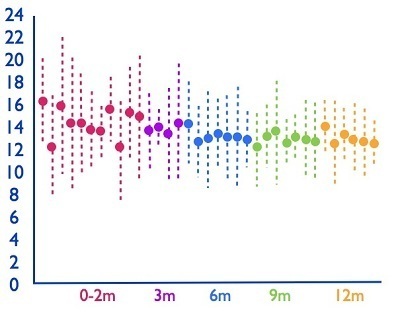Normal Sleep Development
Normal Sleep Development
Popular beliefs about when babies should be ‘sleeping through the night’ are based on studies conducted in the 1950s and 1960s on groups of formula-fed babies. However, it is normal for babies – especially breastfed babies – to wake and feed throughout the night during, at least, the first year. Encouraging babies to ‘sleep through’ before they are ready to do so makes it difficult to keep breastfeeding and may encourage babies to develop mature sleep patterns out of sequence with their other circadian patterns, such as those controlling the regulation of temperature, hormone production, and the genes that control our biological rhythms.
Babies operate according to their own internal biological rhythms, and they are unaware of what their parents are reading or being told. Babies do not have a body clock when they are born. It often takes several months for a baby’s day-night pattern of wake and sleep to become established, and for night-time sleep consolidation to happen. During this time many parents just need reassurance that their baby is normal, and that their baby’s sleep patterns are developing as expected.
New-born babies may sleep for 18 or so hours a day, but often for only for 2-3 hours at a time. During the first-year overall sleep duration falls to around 15 hours a day, and the majority of sleep becomes concentrated during night-time as the circadian rhythms* develop.
Sleep variation
In a comprehensive systematic review (Galland et al. 2012) combined data from 34 studies relating to normal infant sleep duration. The chart below shows part of this data for babies aged up to one year. Data from each study & age range are represented by a dot which shows the average total sleep experienced. [The dotted line shows the amount of variation around that average.] It is clear that younger babies sleep longer overall, but there is also a lot of variation among individual babies, and within studies for this group.

Sleep is a developmental process, and our sleep needs change throughout our lifetimes. Babies’ sleep patterns mature over the first several years of life, and the sleep architecture of newborns is very different to that of adults. Newborns sleep for 18-20 or so hours a day, but only for 2-3 hours at a time. During the first-year overall sleep duration falls to around 15 hours, and the majority of sleep becomes consolidated during night-time as circadian rhythms develop (Parmelee et al 1964).
*Circadian rhythms – biological processes which are roughly tied to the 24-hour day, and periods of daylight and dark. Processes regulated by our circadian rhythms include heart rate, temperature and our ‘body clock’, along with the production of hormones which make us feel sleepy or alert.*
